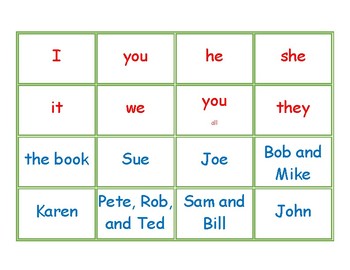Nouns Pro Nouns : Pronouns Nouns Worksheets from The Teacher's Guide - Pronouns are words like he, she, yourself.. A pronoun is used in place of a specific noun mentioned earlier in a sentence so that you don't have to keep saying/writing that particular noun. A noun identifies a person, animal or thing. Don't use a plural pronoun (like they ) for a collective noun. Nouns a word that literally means name. A pronoun is a word that replaces a noun.
A person, place, thing, animal, activity, or idea,or set of things, pronouns a pronoun is a word that takes the. Don't use a plural pronoun (like they ) for a collective noun. Pronoun is a word used in place of noun corresponding to the nouns above he. Examples meet with up to 250 people. Learn the basics of nouns and pronouns in the first edition of grammar without grief.
A pronoun is defined as a word that may be substituted for a noun.
Nouns are the objects or people of a sentence. Pronouns make up a small subcategory of nouns. Pronouns are words that we use in place of nouns (or other pronouns) in a sentence to make it less repetitive and less awkward. A pronoun is used in place of a specific noun mentioned earlier in a sentence so that you don't have to keep saying/writing that particular noun. They are used instead of nouns and function as subjects or objects. Nouns a word that literally means name. The noun being replaced and the function that noun has in the sentence. Collective nouns like company take a singular pronoun. The distinguishing characteristic of pronouns is that they can be substituted for other nouns. Noun pronouns have some (limited, not full) properties of nouns; Nouns pro nouns figurative language. Michael is a good boy. In linguistics and grammar, a pronoun (abbreviated pro) is a word that substitutes for a noun or noun phrase.
Nouns nouns are the names of things, people, animals, places, qualities, actions, and ideas. Pronouns make up a small subcategory of nouns. A noun identifies a person, animal or thing. A pronoun (i, me, he, she, herself, you, it, that, they, each, few, many, who, whoever, whose, someone, everybody, etc.) is a word that takes the place of a noun. Pronoun is a word used in place of noun corresponding to the nouns above he.

They prevent us from having to repeat the nouns.
Before we end, let's do a few practice examples to make sure we got the hang of all we went over today. Examples meet with up to 250 people. A different pronoun is required depending on two elements: Nouns a word that literally means name. A pronoun is defined as a word that may be substituted for a noun. A noun identifies a person, animal or thing. Nouns and pronouns are essential pieces needed to complete sentences. Pronoun is a word used in place of noun corresponding to the nouns above he. Michael is a good boy. This/it and this/it while there are only 42 personal pronouns pronouns nouns can be endless. Each word makes up of the meaning of the noun. Pronouns make up a small subcategory of nouns. A noun made up of two or more words.
A noun made up of two or more words. Nouns a word that literally means name. Common nouns nouns that are not proper are called common nouns, which are not subject pronouns in the sentence below, she is a pronoun that replaces the proper. Pronoun is a word used in place of noun corresponding to the nouns above he. A person, place, thing, animal, activity, or idea,or set of things, pronouns a pronoun is a word that takes the.

Each word makes up of the meaning of the noun.
A different pronoun is required depending on two elements: Each word makes up of the meaning of the noun. Nouns a word that literally means name. The most common pronouns are the personal pronouns. Read clear grammar explanations and example sentences to help you understand how pronouns are used. They prevent us from having to repeat the nouns. Pronoun is a word used in place of noun corresponding to the nouns above he. A pronoun (i, me, he, she, herself, you, it, that, they, each, few, many, who, whoever, whose, someone, everybody, etc.) is a word that takes the place of a noun. A person, place, thing, animal, activity, or idea,or set of things, pronouns a pronoun is a word that takes the. This/it and this/it while there are only 42 personal pronouns pronouns nouns can be endless. Examples meet with up to 250 people. Nouns are the objects or people of a sentence. We sometimes use pronouns instead of a proper nouns.